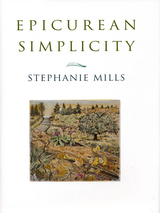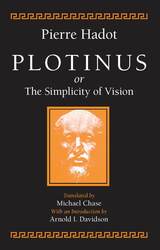
"In this book, I relate the pleasures, as well as the virtues and difficulties of a perhaps simpler than average North American life." So begins ecological thinker and writer Stephanie Mills's Epicurean Simplicity, a thoughtful paean to living, like Thoreau, a deliberate life.
Mills's account of the simple life reaches deep into classical sources of pleasure -- good food, good health, good friends, and particularly the endless delights of the natural world. Her musings about the life she desires -- and the life she has created -- ultimately led her to the third century Greek philosopher Epicurus, whose philosophy was premised on the trustworthiness of the senses, a philosophy that Mills wholeheartedly embraces. While later centuries have come to associate Epicurus's name with hedonism, Mills discovered that he extolled simplicity and prudence as the surest means to pleasure, and his thinking offers an important philosophical touchstone for the book.
As the author explains, one of the primary motivations for her pursuit of simplicity is her concern about the impacts of a consumerist lifestyle on the natural world. Mills touches on broad range of topics relating to that issue -- social justice, biological extinctions, the global economy, and also more personal aspects such as friendship, the process of country living, the joys of physical exertion, the challenges of a writer's life, and the natural history and seasonal delights of a life lived close to nature. An overarching theme is the destructiveness of consumerism, and how even a simple life affects a wide range of organisms and adds strain to the earth's systems. The author uses her own experience as an entry point to the discussion with a self-effacing humor and lyrical prose that bring big topics to a personal level.
Epicurean Simplicity is beautifully crafted, fluid, inspiring, and enlightening, examining topics of critical importance that affect us all. It celebrates the pleasures, beauty, and fulfillment of a simple life, a goal being sought by Americans from all walks of life, from harried single parents to corporate CEOs. For fans of natural history or personal narrative, for those concerned about social justice and the environment, and for those who have come to know and love Stephanie Mills through her speaking and writing, Epicurean Simplicity is a rare treasure.


Hadot carefully examines Plotinus's views on the self, existence, love, virtue, gentleness, and solitude. He shows that Plotinus, like other philosophers of his day, believed that Plato and Aristotle had already articulated the essential truths; for him, the purpose of practicing philosophy was not to profess new truths but to engage in spiritual exercises so as to live philosophically. Seen in this light, Plotinus's counsel against fixation on the body and all earthly matters stemmed not from disgust or fear, but rather from his awareness of the negative effect that bodily preoccupation and material concern could have on spiritual exercises.

“If it were necessary, for some curious legal reason, to draw a clear line between human and nonhuman—for example, if a group of Australopithecines were to appear and one had to decide if they were to be protected by Fair Employment Laws or by the ASPCA—I would welcome them as humans if I knew that they were seriously concerned about how to bury their dead.” In this witty and wise way, Lawrence Slobodkin takes us on a spirited quest for the multiple meanings of simplicity in all facets of life.
Slobodkin begins at the beginning, with a consideration of how simplicity came into play in the development of religious doctrines. He nimbly moves on to the arts—where he ranges freely from dining to painting—and then focuses more sharply on the role of simplicity in science. Here we witness the historical beginnings of modern science as a search for the fewest number of terms, the smallest number of assumptions, or the lowest exponents, while still meeting criteria for descriptive accuracy. The result may be an elegant hypothetical system that generates the apparent world from less apparent assumptions, as with the Newtonian revolution; or it may mean deducing non-obvious processes from everyday facts, as with the Darwinian revolution.
Slobodkin proposes that the best intellectual work is done as if it were a game on a simplified playing field. He supplies serious arguments for considering the role of simplification and playfulness in all of our activities. The immediate effect of his unfailingly captivating essay is to throw open a new window on the world and to refresh our perspectives on matters of the heart and mind.
READERS
Browse our collection.
PUBLISHERS
See BiblioVault's publisher services.
STUDENT SERVICES
Files for college accessibility offices.
UChicago Accessibility Resources
home | accessibility | search | about | contact us
BiblioVault ® 2001 - 2024
The University of Chicago Press









